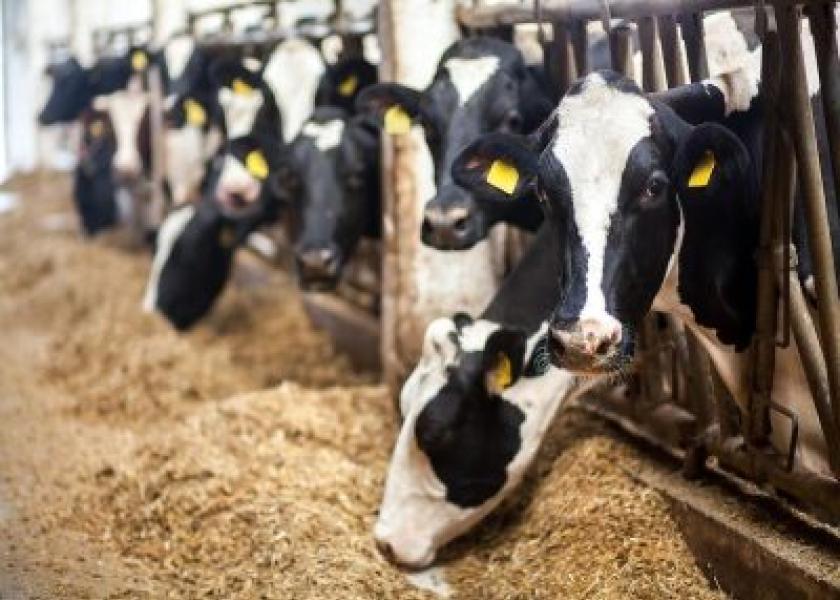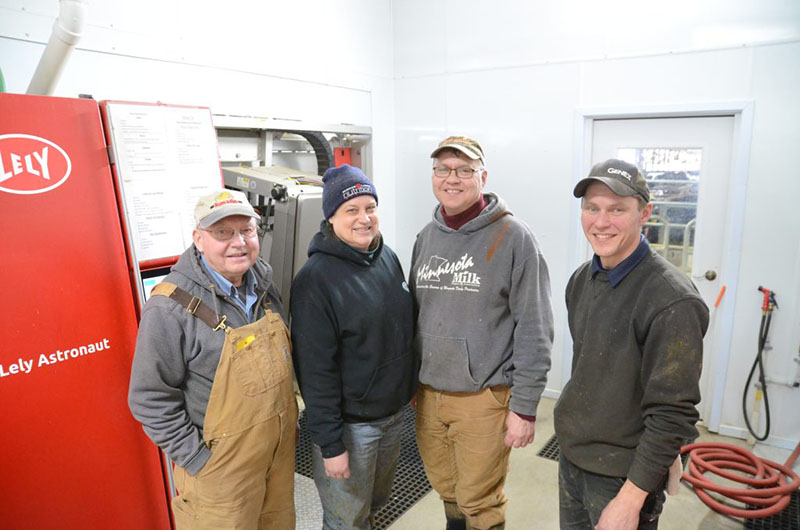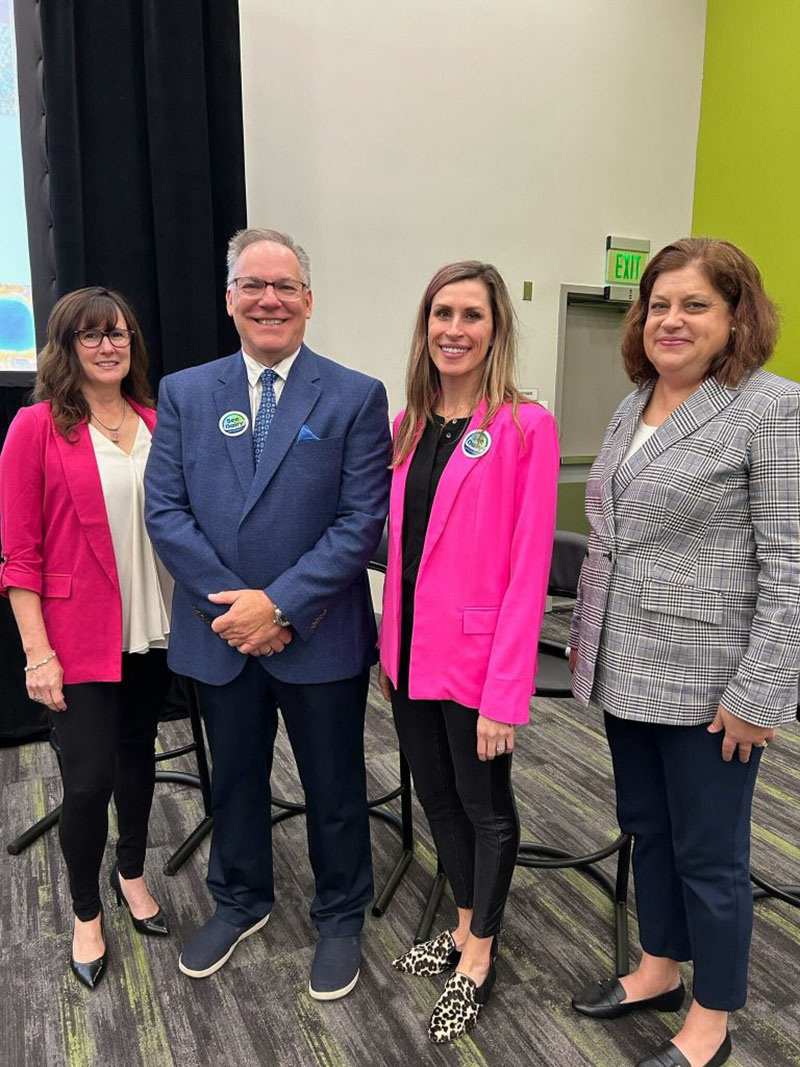How One Dairy Farmer Found Herself on the VERGE of the Climate Conversation

It’s not easy for Suzanne Vold to leave the day-to-day business of the dairy farm that she runs alongside her husband and brother-in-law. After all, the fourth-generation farm in Minnesota has 500 cows and 600 acres of row crops that supply forage and grain for the herd.
But, in October, Vold received an offer that she felt was too important to turn down—the chance for a farmer to take a seat at one of the largest climate-tech events in the nation. Courtesy of the Innovation Center for U.S. Dairy, an America’s Conservation Ag Movement Partner and Premier Sponsor of GreenBiz VERGE, which hails itself as “the center of gravity for the climate community,” Vold gladly removed her work boots and gloves for four days of discussions around agriculture and its impact on climate.
For the Innovation Center for U.S. Dairy, bringing Vold along for the conference, and even crafting a panel discussion that included her and other dairy value chain members, was a chance to bring agriculture to a table where it had largely been absent.
“In our years participating in GreenBiz VERGE, we recognized the farmer perspective was often missing from conversations, so we prioritized opportunities to elevate their important voice,” said Karen Scanlon, Executive Vice President, Environmental Stewardship, Dairy Management, Inc. “Agriculture has a tremendous opportunity to grow solutions to critical environmental challenges. We have to focus on how to best support and invest in farms as they make decisions that work for their family businesses, their communities and our planet.”
Having Vold in attendance was also a step to help ensure that their industry’s sustainability goals and achievements are not only recognized, but also attract partners who can help accelerate the path to success.
Vold is no stranger to thinking about sustainability, both in her operation and in the industry. It’s why she was a natural fit to help the Innovation Center for U.S. Dairy accomplish their goals at VERGE 2023.
Dorrich Dairy has taken strides to up the sustainability on their farm, most recently converting to robotic milking and implementing a continuous flow manure composter, which runs 24/7 to turn solid waste into bedding for the dairy cows, a marketable product for other farms and even compost soil companies.

Vold has taken leadership roles within the industry to elevate dairy’s role in sustainable food systems. She currently serves as chair of the DMI Environmental Stewardship Committee. For the Innovation Center for U.S. Dairy, she has served on the U.S. Dairy Stewardship Commitment Committee and the Task Force on Regenerative Agriculture and Biodiversity, and helped shape the industry’s protocols on GHG corporate standards and net zero goals and measurement.
Trust In Food spoke with Vold during VERGE 23 to learn how her attendance was received by the climate audience and what perspectives she brought from her farm to share with attendees.
Trust In Food: What has surprised you most about attending VERGE 23 with the Innovation Center for U.S. Dairy?
Vold: I’m excited to see that many attendees are supportive of farmers, but there are very few producers here. I would like to see more of us here who are on the front lines. Very often, farmers get talked at and not with. We know our farms, we know our animals, and we know our land. We know what works and what doesn’t because we are generational businesses. We are not in it for the short term. When we make decisions on our farm, whether it’s a day-to-day decision or a huge capital investment, we are thinking about what is the right thing to do for the next generation?
I am surprised, also, to see that so many people are excited to talk to a farmer. Am I happy to talk to them? Absolutely, but I can only share what’s happening on my farm. Every farm is different, not only in location, climate, and soil, but every farm is a unique individual operation.
Why was it important that you take this opportunity to attend VERGE 23 with the Innovation Center for U.S. Dairy?
As a dairy industry, we believe in the power of collaboration, and that includes farmers like me speaking up and being on the front lines at events like GreenBiz VERGE. We know events like these often result in decisions being made that will affect what we do on our farms, and no one knows a farm better than the farmer who runs it. We are the ones getting our hands dirty every day. So, we need a seat at the table to listen, to learn and to educate.

The thing that is on everyone’s mind here at VERGE is also the thing that is on your mind every day on your farm – the weather and how climate is changing. How are you working to mitigate weather changes on your farm?
I can tell you what I’ve seen on my farm as far as changing climate and it’s that we’ve had more extreme weather events in the last decade than we did in my first 10-15 years farming. As I watch the news and see extreme weather events around the country, there are more of them.
In my area in Minnesota, in 2021, we were in extreme drought, all year. That decreased our forage harvest by 40-50%, so we had to purchase that much more feed. We are still paying off debt from those purchases. This year, the drought was more moderate, so our second and third crop was not up to standard. We don’t have irrigation because we haven’t needed it. The last few years have made us wonder, though, if we do.
Are there things I can do to improve my soil health to avoid irrigation? Yes. Am I looking at those? Yes. They are expensive, so can I do them alone? Probably not. That’s why events like GreenBiz VERGE are such a great opportunity to learn and collaborate with others who I know are experiencing similar challenges.







